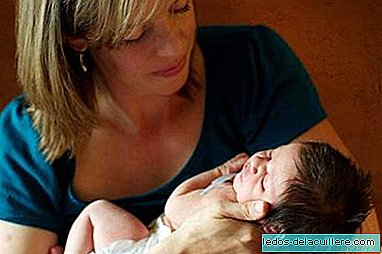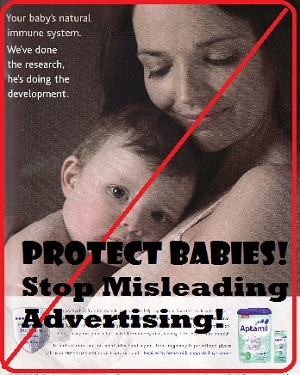He is very still, will he still breathe? Will I have buckled the car seat correctly? Has something been swallowed at this moment in which I was not looking? If you are a father or mother, you have been assaulted at some point by these concerns. The most common is that you check if you have done it and do not give more turns but, what happens when we are not able to stop thinking about these things? What happens when we need to check, again and again if we have done it? We tell you what is the Obsessive-compulsive disorder and what are its characteristics in the postpartum.
Concerns, obsessions and Obsessive Compulsive Postpartum Disorder
We must distinguish between worries, obsessive-compulsive symptoms and what is properly known as OCD (obsessive compulsive disorder). The first ones are absolutely habitual, normal and expected when we have just been mothers (and fathers), we all want our children to be well, right?
On the other hand there are obsessive-compulsive symptoms, which are a bit more “powerful”: recurrent and uncontrollable concerns about the well-being of our baby that lead us to experience anxiety and develop some behaviors such as checking more than once we have done something or that the little one is fine, for example.
A study conducted at Northwestern University found that approximately 11% of women had obsessive-compulsive symptoms between two and six weeks after delivery. To give us an idea, the rate in the rest of the population is between 2 and 3%.
Where is the difference then with the disorder? Worrying about the well-being of our baby and keeping him safe is normal in parenting. In the case of OCD (obsessive compulsive disorder) the problem is that worry is invasive, exaggerated and generates anxiety so tremendous that it can lead us to have repetitive thoughts or behaviors aimed, precisely, to calm her down. "If I don't check three times or more if the baby is well, something will happen to him", for example.
The incidence of Obsessive Compulsive Disorder in postpartum appears to be between 2 and 9% according to a study conducted at the University of Miami.
These obsessions and compulsive behaviors in the case of maternity or recent paternity must be taken into account since they can lead us, paradoxically, to not take proper care of our baby.
If you have the slightest doubt about whether your thoughts are "out of control" or if you fear harming your baby, do not hesitate to go to a specialist as soon as possible. Surely it can help you.
Why does it occur?
The specific origin of this disorder in postpartum is unknown, but there are two theories that have more weight: genetic and hormonal factors (the change in estrogen, progesterone and oxytocin levels), and factors related to mental processing (a Exaggerated attention to certain thoughts that causes you to loop in, increasing emotional distress more and more: "I worry because I care").
Symptom:
Thoughts (obsessions) and behaviors (compulsions) about the baby (and his well-being) that cause high anxiety and that we cannot control. Some of these intrusive thoughts (they appear without us wanting to and we cannot get rid of them), I warn that they can be especially unpleasant, they can be of the type:
- To think that the baby will suffer sudden death
- Feel the urge to shake you to see what happens
- Think of lifeless babies
- Imagine we drowned the baby
- The idea of putting the baby in dangerous places, such as high places from which it could fall or even the microwave
- To think that something is wrong with our little one and we can't save him
- Etc.
Between the background that may influence their appearance are having or having had anxiety or mood disorders (depression), the presence of previous episodes of obsessions and compulsions, among others.

Good prenatal information could help prevent it
Experts seem to agree that the information received by the mother during pregnancy could be a prevention factor.
Why? Many women (and men, although studies have focused more on women in the case) have come to maternity with an idea of it that is far from reality: all love, a little tired, yes, but Everything will be positive and great.
But when the time comes many discover that it was not as they had sold it, that motherhood is exhausting and that sometimes it surpasses us. In this context of fatigue it is very common to have "absurd" or illogical, very extreme thoughts, thoughts that may even frighten us for the mere fact of having them.
Not only does it happen to recent mothers, all adults have many automatic thoughts of this kind (absurd, like What will happen if I cross in front of this car? or What if I drink this shampoo?) during the day. In most cases we simply ignore them because we don't find any meaning (they don't, in fact) and obviously we don't consider "paying attention to them."
In other cases, yes We pay attention to them, and we believe something bad happens to us for having thought about that. That concern in case "we are wrong" can actually make us emotionally worse: it is the whiting that bites its tail.
Hence, the information during pregnancy is so so important: if we know that we can get to have "very rare" thoughts but that it is absolutely normal (as long as they do not escape our control), if we know how to handle the situation, if They have explained to us what we can expect and what to expect ... then our concern will be less, and therefore the possibility of suffering from these symptoms or the disorder itself would also be minor.
This is indicated by a study carried out in 2011 in which the prevention capacity of a cognitive-behavioral program was tested, which showed that the amount of obsessions and compulsions was much lower in those women who had received information and specific training in this regard during their prenatal classes.
In any case, and I insist again, sIf you have the slightest doubt about your status or that of your partner, do not hesitate, go to a professional I advise you. Living with anxiety, anguish or thoughts that do not let us "or breathe" is terrible, do not leave.
Photos: Pixabay.com
In Babies and more: Would you leave your baby sleeping alone in a hotel room while you go down to dinner?












